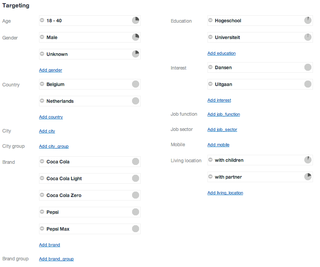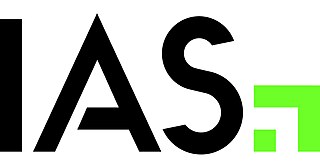A web banner or banner ad is a form of advertising on the World Wide Web delivered by an ad server. This form of online advertising entails embedding an advertisement into a web page. It is intended to attract traffic to a website by linking to the website of the advertiser. In many cases, banners are delivered by a central ad server. This payback system is often how the content provider is able to pay for the Internet access to supply the content in the first place. Usually though, advertisers use ad networks to serve their advertisements, resulting in a revshare system and higher quality ad placement.
Digital display advertising is online graphic advertising through banners, text, images, video, and audio. The main purpose of digital display advertising is to post company ads on third-party websites. A display ad is usually interactive, which allows brands and advertisers to engage deeper with the users. A display ad can also be a companion ad for a non-clickable video ad.
Google AdSense is a program run by Google through which website publishers in the Google Network of content sites serve text, images, video, or interactive media advertisements that are targeted to the site content and audience. These advertisements are administered, sorted, and maintained by Google. They can generate revenue on either a per-click or per-impression basis. Google beta-tested a cost-per-action service, but discontinued it in October 2008 in favor of a DoubleClick offering. In Q1 2014, Google earned US$3.4 billion, or 22% of total revenue, through Google AdSense. In 2021, more than 38 million websites used AdSense. It is a participant in the AdChoices program, so AdSense ads typically include the triangle-shaped AdChoices icon. This program also operates on HTTP cookies.
Click fraud is a type of fraud that occurs on the Internet in pay per click (PPC) online advertising. In this type of advertising, the owners of websites that post the ads are paid based on how many site visitors click on the ads. Fraud occurs when a person, automated script, computer program or an auto clicker imitates a legitimate user of a web browser, clicking on such an ad without having an actual interest in the target of the ad's link in order to increase revenue. Click fraud is the subject of some controversy and increasing litigation due to the advertising networks being a key beneficiary of the fraud.
Pay-per-click (PPC) is an internet advertising model used to drive traffic to websites, in which an advertiser pays a publisher when the ad is clicked.
Online advertising, also known as online marketing, Internet advertising, digital advertising or web advertising, is a form of marketing and advertising that uses the Internet to promote products and services to audiences and platform users. Online advertising includes email marketing, search engine marketing (SEM), social media marketing, many types of display advertising, and mobile advertising. Advertisements are increasingly being delivered via automated software systems operating across multiple websites, media services and platforms, known as programmatic advertising.

Roku, Inc. is an American streaming technology company, founded in 2002 by Anthony Wood. It produces streaming players and TVs, licenses its technology to other manufacturers, and distributes streaming services on its platform. Roku leads streaming TV distribution in the U.S., reaching 120 million viewers as of 2024. Outside the U.S., the company operates in Australia, Canada, France, Germany, the U.K., and Latin American countries including Argentina, Brazil, Chile, Colombia, Mexico and Peru.

Targeted advertising is a form of advertising, including online advertising, that is directed towards an audience with certain traits, based on the product or person the advertiser is promoting.

Infillion, formerly known as Gimbal | true[X], TrueX, Inc. and SocialVibe, is an American digital advertising company founded in 2007 by Joe Marchese, Brandon Mills and David Levy. The company is headquartered in Los Angeles and New York City. It was previously owned by 21st Century Fox, from 2014 until Disney's acquisition of 21st Century Fox in 2019, and The Walt Disney Company from 2019 until 2020.
Video advertising encompasses online display advertisements that have video within them, but it is generally accepted that it refers to advertising that occurs before, during and/or after a video stream on the internet, as well as within programmatic placements on publisher sites.
In the online advertising industry, a viewable impression is a measure of whether a given advert was actually seen by a human being, as opposed to being out of view or served as the result of automated activity. The viewable impression guidelines are administered by the Media Rating Council and require that a minimum of 50% of the pixels in the advertisement were in an in-focus tab on the viewable space of the browser page for at least one continuous second.
A demand-side platform (DSP) is a concept that combines various software for advertisers to automate the process of buying and selling ad impressions in real time.

Real-time bidding (RTB) is a means by which advertising inventory is bought and sold on a per-impression basis, via instantaneous programmatic auction, similar to financial markets. With real-time bidding, online advertising buyers bid on an impression and, if the bid is won, the buyer's ad is instantly displayed on the publisher's site. Real-time bidding lets advertisers manage and optimize ads from multiple Ad networks, allowing them to create and launch advertising campaigns, prioritize networks, and allocate percentages of unsold inventory, known as backfill.
Native advertising, also called sponsored content, partner content, and branded journalism, is a type of paid advertising that appears in the style and format of the content near the advertisement's placement. It manifests as a post, image, video, article or editorial piece of content. In some cases, it functions like an advertorial. The word native refers to the coherence of the content with the other media that appear on the platform.

Telemetry was an independent online advertising security and optimization firm, with offices in London and New York City. In January 2017, Telemetry shut down amid declining revenues.
TubeMogul is an enterprise software company for brand advertising.

Integral Ad Science (IAS) is an American publicly traded technology company that analyzes the value of digital advertising placements. Integral Ad Science is known for addressing issues around fraud, viewability and brand risk, as well as TRAQ, a proprietary media quality score.
Videology is an advertising software company based in New York City. It was founded in 2007 as Tidal TV and launched a Hulu competitor in 2008. In 2012, it was rebranded as Videology and now develops software that sends ads to specific demographics within an audience of video viewers, performs analytics, and other functions.
Innovid is an American online advertising technology company that offers services used by advertisers and publishers for the distribution and management of digital ads. Originally launched as a video marketing platform, the company expanded its offering to include display and digital out-of-home when Herolens was acquired in 2019.
Taboola, Inc. is a publicly traded advertising and technology company headquartered in New York City. It provides "content recommendation" adverts on its partner websites.






